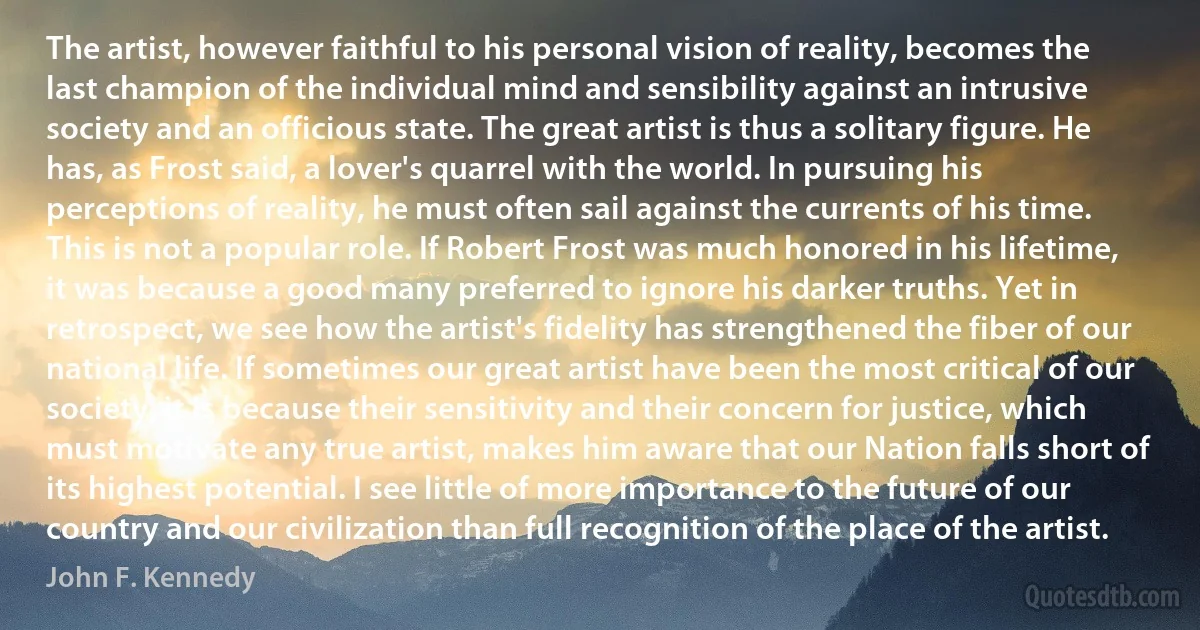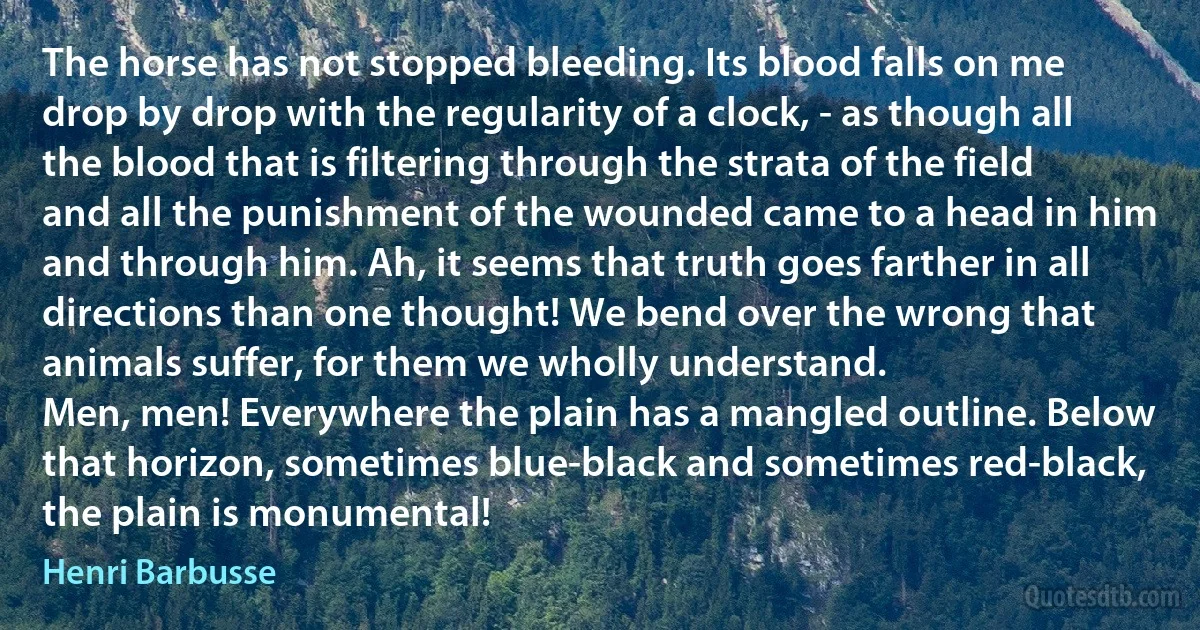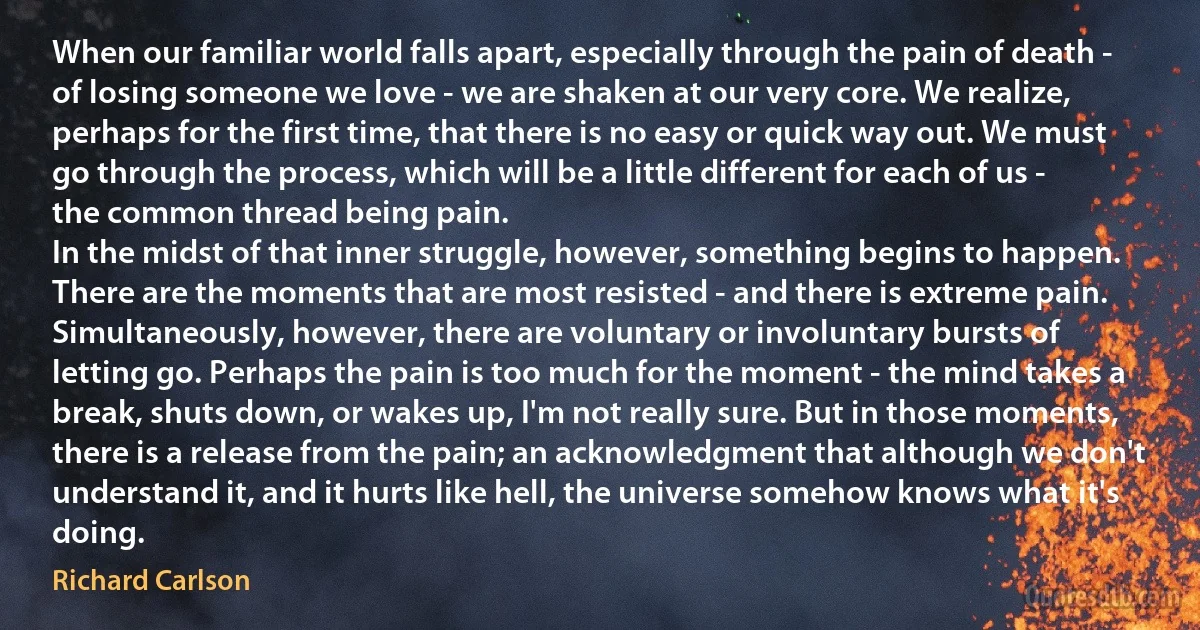Falls Quotes - page 34
The demons start the warfare in the imagination; they cultivate it with thoughts; they defile the nous, they take it down into the heart; and they make both the soul and the body filthy. What decides a person's entire progress or failure is whether he gives in to or resists the attacks of the imagination. If he makes the mistake of beginning a dialogue with the sinful assault and accepting the devil's garbage by his own consent, what will follow are falls of the sould, mind, heart, and body. As a result, the passion will take him captive.

Seraphim Rose
If Jerusalem falls into the hands of the Muslims, Athens and Rome will be next. Thus, Jerusalem is the main front protecting the West. It is not a conflict over territory but rather an ideological battle, between the mentality of the liberated West and the ideology of Islamic barbarism. There has been an independent Palestinian state since 1946, and it is the kingdom of Jordan.

Geert Wilders
In a highly developed society, the Establishment cannot survive without the obedience and loyalty of millions of people who are given small rewards to keep the system going: the soldiers and police, teachers and ministers, administrators and social workers, technicians and production workers, doctors, lawyers, nurses, transport and communications workers, garbage men and firemen. These people-the employed, the somewhat privileged-are drawn into alliance with the elite. They become the guards of the system, buffers between the upper and lower classes. If they stop obeying, the system falls.

Howard Zinn
As the title of his 1941 book indicates, the theory of capital lay at the heart of his theory of the cycle. The reason is that he attributes the cycle not to changes in aggregate demand, or even to changes in the quantity of capital, but to changes in the structure of production and hence the structure of the capital stock. In this, his theory was highly unusual: one of the reasons for his failure to engage more effectively with Keynes was the latter's inability to see how the theory of capital could be of any importance for the cycle. Because the theory of capital is so central, and because it is so complex, it needs to be explained carefully. After that, the rest of his theory falls into place comparatively easily.

Friedrich Hayek
Don't you think something is fishy when the presstitutes orchestrate a fake news "humanitarian crisis” in Venezuela, but totally ignore the real humanitarian crises in Yemen and Gaza? Don't you think something is really very rotten when the expert, Alfred Maurice de Zayas, sent by the UN to Venezuela to evaluate the situation finds no interest by any Western media or any Western government in his report? Don't you think it is a bit much for Washington to steal $21 billion of Venezuela's money, impose sanctions in an effort to destabilize the country and to drive the Venezuelan government to its knees, blame Venezuelan socialism (essentially nationalization of the oil company) for bringing "starvation to the people"... As the United States is completely devoid of any print or TV media, it falls upon internet media such as this website to perform the missing function of honest journalism.

Alfred de Zayas
Under the influence of politicians, masses of people tend to ascribe the responsibility for wars to those who wield power at any given time. In the First World War it was the munitions industrialists; in the Second World War it was the psychopathic generals who were said to be guilty. This is passing the buck. The responsibility for wars falls solely upon the shoulders of these same masses of people, for they have all the necessary means to avert war in their own hands.

Mike Jones
... the only contestant who can confidently enter the lists is the man who has seen his own blood, who has felt his teeth rattle beneath his opponent's fist, who has been tripped and felt the full force of his adversary's charge, who has been downed in body but not in spirit, one who, as often as he falls, rises again with greater defiance than ever.

Seneca
It's said that Chaplin wanted you to like him, but Keaton didn't care. I think he cared, but was too proud to ask. His films avoid the pathos and sentiment of the Chaplin pictures, and usually feature a jaunty young man who sees an objective and goes for it in the face of the most daunting obstacles. Buster survives tornados, waterfalls, avalanches of boulders, and falls from great heights, and never pauses to take a bow: He has his eye on his goal. And his movies, seen as a group, are like a sustained act of optimism in the face of adversity; surprising, how without asking, he earns our admiration and tenderness.
Because he was funny, because he wore a porkpie hat, Keaton's physical skills are often undervalued ... no silent star did more dangerous stunts than Buster Keaton. Instead of using doubles, he himself doubled for his actors, doing their stunts as well as his own.

Roger Ebert
What are you doing?” the Countess asked....
"Just...wrestling with temptation.”
Illyan's voice came back, amused. "Who's winning?”
Miles's eye followed the cracks in the plaster, overhead. His voice came out high and light, on a sigh: "I think...I'm going for the best two falls out of three.

Lois McMaster Bujold
[Hitler] is formless, almost faceless, a man whose countenance is a caricature, a man whose framework seems cartilaginous, without bones. He is inconsequent and voluble, ill-poised, insecure. He is the very prototype of the Little Man. A lock of lank hair falls over an insignificant and slightly retreating forehead. The back head is shallow. The face is broad in the check-bones. The nose is large, but badly shaped and without character. His movements are awkward, almost undignified and most un-martial. There is in his face no trace of any inner conflict or self-discipline.

Dorothy Thompson
I thought back over my life. How does a man come to climb mountains? Is he drawn by the heights because he is afraid of the level land? Is he such a misfit in the society of men that he must flee and try to place himself above it? The way up is long and difficult, but if he succeeds they must grant him a garland of sorts. And if he falls, this too is a kind of glory. To end, hurled from the heights to the depths in hideous ruin and combustion down, is a fitting climax for the loser-for it, too, shakes mountains and minds, stirs things like thoughts below both, is a kind of blasted garland of victory in defeat, and cold, so cold that final action, that the movement is somewhere frozen forever into a statuelike rigidity of ultimate intent and purpose thwarted only by the universal malevolence we all fear exists. An aspirant saint or hero who lacks some necessary virtue may still qualify as a martyr, for the only thing that people will really remember in the end is the end.

Roger Zelazny
The surrender of the Confederate armies in 1865 involved: 1. The surrender of the claim to the right of secession. 2. The surrender of the former political relations of the negro. 3. The surrender of the Southern Confederacy. These issues expired on the fields last occupied by the Confederate armies. There they should have been buried. The soldier prefers to have the sod that receives him when he falls cover his remains. The political questions of the war should have been buried upon the fields that marked their end.

James Longstreet
[For Winston Churchill], democracy is a state in which the people acquiesce in the rule of property. Democracy is an admirable institution so long as the poor continue to carry the rich on their backs. When the poor decide to change places, democracy falls into disrepute. That is why, whenever you scratch a Tory, you find a Fascist.

Aneurin Bevan
National Socialism is a form of Socialism, is emphatically revolutionary, does crush the property owner as surely as it crushes the worker. The two regimes, having started from opposite ends, are rapidly evolving towards the same system-a form of oligarchical collectivism. . . . It is Germany that is moving towards Russia, rather than the other way about. It is therefore nonsense to talk about Germany ‘going Bolshevik' if Hitler falls. Germany is going Bolshevik because of Hitler and not in spite of him.

George Orwell
During part of 1941 and 1942, when the Luftwaffe was busy in Russia, the German radio regaled its home audience with stories of devastating air raids on London. Now, we are aware that those raids did not happen. But what use would our knowledge be if the Germans conquered Britain? For the purpose of a future historian, did those raids happen, or didn't they? The answer is: If Hitler survives, they happened, and if he falls they didn't happen. So with innumerable other events of the past ten or twenty years. Is the Protocols of the Elders of Zion a genuine document? Did Trotsky plot with the Nazis? How many German aeroplanes were shot down in the Battle of Britain? Does Europe welcome the New Order? In no case do you get one answer which is universally accepted because it is true: in each case you get a number of totally incompatible answers, one of which is finally adopted as the result of a physical struggle. History is written by the winners.

George Orwell
You ever do a little delete game? Do you like to do that? You go through, you take your contact list, sometimes you're just in the doctor's office right? You start scrolling through, you're like...who don't I need? Who don't I need in my life? Where can I get a megabyte of space back right now? And it's kinda fun right? You just scroll through...er Peter, Peter, yeah fuck Peter, BOOM! And you really hit that delete button like you're deleting Peter from existence. Peter is sitting half way around the world eating a steak and the second you hit that button he just turns to vapor: VVVVVVVV!! The fork falls: Tingtingtingelingtingting! The person that's sitting across him is like: "PETER!". Peter is gone. Poof!

Dane Cook
My Soul. Such fullness in that quarter overflows
And falls into the basin of the mind
That man is stricken deaf and dumb and blind,
For intellect no longer knows
Is from the Ought, or knower from the Known -
That is to say, ascends to Heaven;
Only the dead can be forgiven;
But when I think of that my tongue's a stone.

William Butler Yeats



